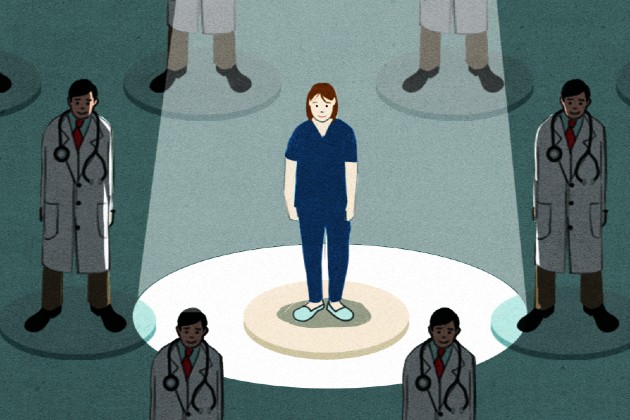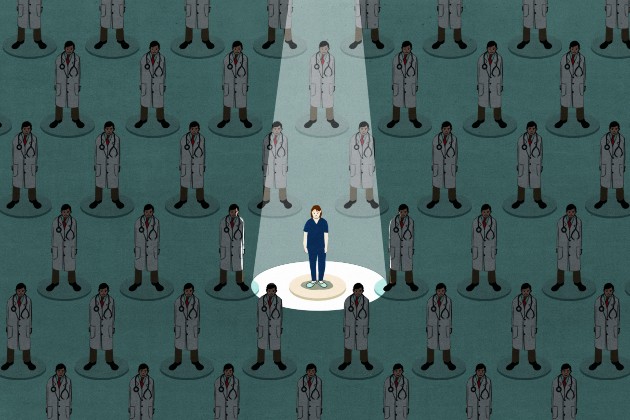“You will fail.” That’s what I was told when I first got elected to my role as clinical director in my primary care network in 2019. Of course, that was like a red rag to a bull, and I’ve since been re-elected unopposed into my post, so I guess that rather ignorant comment hasn’t aged well.
Perhaps some people just weren’t ready for a nurse to take on a role which many expected to go to a GP, especially a nurse who had just moved to the area.
I was actually looking for a break from strategic work at the time, but my interest was piqued by this new role, so I went along to a meeting about it. There it was clear that people assumed the new clinical director role would be a GP. I questioned this and was told: “You can apply if you want”.
I knew I was capable and equipped for the role
At that time, I’d worked in general practice for more than 20 years, had experience of leading in a community interest company and had also recently been awarded the title of Queen’s Nurse. Clinically, I was at the top of my game, so I knew I was capable and equipped for the role.
It was then I found out there would be an election for the position and I would be standing against two established GPs. The practice GPs vote, with each practice having one vote.
This didn’t feel fair to me, but I went ahead anyway and must admit I was shocked when I succeeded in getting the role. Maybe those in general practice realised it was time to try something new and I was that new something.
What is a clinical director in a primary care network?
Primary care networks (PCNs) are groups of practices in England working together to focus on local patient care. The clinical director is responsible for ensuring leadership to improve quality in the delivery of those services.
Any appropriate clinically qualified person may hold the role. General practice nurses can be appointed as clinical directors of PCNs as well as other non-GP clinicians such as clinical pharmacists, paramedics, and trainee doctors.
A clinical director can be elected or appointed (if uncontested), and they must know and understand the practices of the network, so they can provide appropriate leadership.
Dual roles
In the four years since, I’ve continued to work for two days a week in my advanced nurse practitioner role and spend two days a week working strategically as the clinical director. It’s not always easy to do both, and the roles can overlap.
A lot of my time is spent communicating with people, seeing how they feel and responding to requests for advice, in both roles.
But as a clinical director I also provide leadership, champion causes to improve quality and effectiveness, support practice managers, help with training, plan for the future, attend meetings, set agendas and work collaboratively with other clinical directors. I might also be asked to respond to requests for a range of issues, such as care home funding.
There is no single leadership style that’s 100% the correct one
As a clinical director, I’ve also had the chance to influence policy at a higher level. At the moment I’m involved in NHS Confederation workforce and estates workshops. We’re looking at legacy roles where staff considering retirement can work in mentoring roles for 1 or 2 days a week.
GPs are concerned about the number of GPs retiring but actually it’s about nursing staff and other general practice staff too. Across the range of our roles, a lot of nursing staff are burnt-out, but they can’t afford to retire. This scheme could give them an opportunity to pass on their skills and knowledge.
I’m also focusing on education and getting student nurses into practices. I want it as embedded as it is on wards so that we can safeguard the future of practice nursing.Don’t sit back
Despite receiving that negative comment when I was first elected to the role, the overwhelming majority of people have been supportive. They know I have the same right to an opinion as a GP and I’m not afraid to use my communications skills to voice it appropriately.
Nurses generally are great communicators, who listen and understand. This is essential for this role. Some GPs can be very vocal, so you have to be assertive. You can’t always sit back in meetings and wait to be asked to speak. This may never come. You need to ensure your voice is clearly heard.
I have needed to be confident to do this role, we can all suffer from imposter syndrome. You need to know you’re good enough to be able to do this. As nurses, many of us are great at articulating so if you have to say something important, you should. There is no single leadership style that’s 100% the correct one. Your leadership skills might be what’s needed here.
Too many general practice nurses just don’t know about the leadership opportunities available to them. They already have important roles and they’re often just too busy to take the time to see what’s out there. Sometimes, it’s only when they become a team leader that they find out.

I know it can be difficult for nursing staff to get the time to develop so they can influence at a higher level but if this is something you want to do, put yourself forward for a leadership programme as part of your personal development.
Not only will you get a qualification, it’s a good networking opportunity as you’ll meet other nurse leaders and gain confidence. Ask if you can shadow a board member too. This could be invaluable, as roles often require board experience for you to progress.
Looking forward
Back in 2019 I was one of 16 nurses in the role. Now I’m 1 of only 6. GPs are dominating the role again. You have to be strong to take this on, but I know there are general practice nurses out there who could not only do this role, but excel in it.
Succession planning is important, so we can avoid going back to the old ways of leadership roles defaulting to GPs. They currently hold about 90% of the roles, so we need to be prepared to introduce leaders with different backgrounds and perspectives.
Don’t be afraid of pushing boundaries to achieve greatness
Perhaps my successor could be another nurse, a paramedic or a clinical pharmacist? You don’t always need a lot of experience behind you to be a good leader either. A dynamic person in their 20s with enthusiasm and passion to take things forward could be what’s needed. We need new blood and a diversity in the roles based on backgrounds.
We need to move away from the role being dominated by older, white, male, middle-class GPs and instead embrace the diverse range of people who could lead and succeed in the future. The NHS is always changing. Don’t be afraid of pushing boundaries to achieve greatness and always believe in yourself.
I’ve done it. I broke through the glass ceiling as a nurse clinical director in a role that was written for a GP. Could you?
More information
- Read more about nursing leadership.
- Join the RCN Nurses in Management and Leadership Forum.








